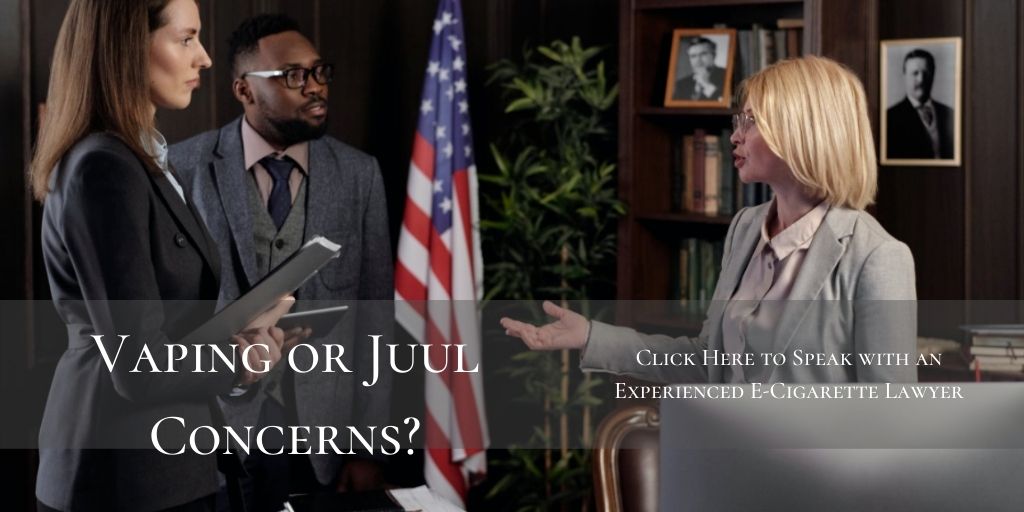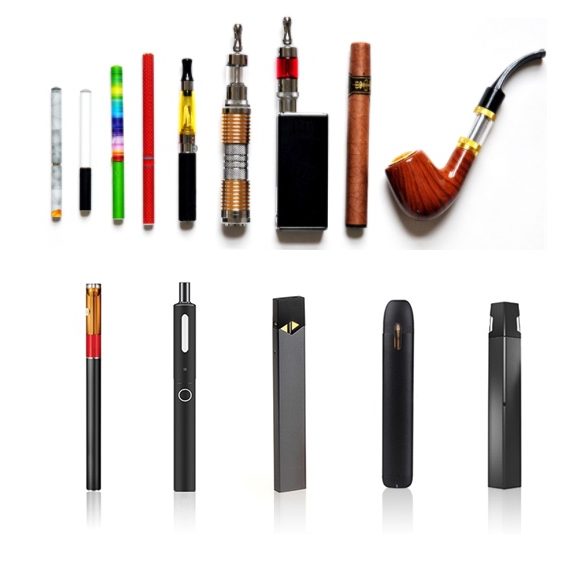Last Updated November 16, 2020
E-Cigarettes and vaping surged onto the American market in 2007 and immediately enjoyed huge success with the public. Whatever success early e-cigarettes enjoyed, however, was nothing compared to the market gallop that followed the introduction of Juul and its particular brand of cartridge-based nicotine delivery. Juul’s rapid adoption by the vaping public accounts for about 40% of the e-cigarette market and in 2018 its parent company, Juul Labs, Inc. was valued at $15 billion.
Throughout vaping’s early days, e-cigarette manufacturers frequently touted their products as “safe” or “safer than tobacco”. These claims went largely unchallenged until recently. Now, e-cigarette users and their families publicly confront manufacturers about their products and the horrible suffering that they believe comes from vaping.
Additionally, public health officials throughout the United States have started to thoroughly document and study some of the associations they are seeing between vaping, addiction, and respiratory distress:
- The American Thoracic Society (ATS) published an article that studied the potential connection between e-cigarette use and Bronchiolitis Obliterans Organizing Pneumonia (BOOP) – a rare lung disorder that makes breathing more difficult.
- In November 2019, a respected medical journal documented its extensive look at the bleak long-term health picture for Vaping Associated Lung Injury (EVALI) in the United States. The Centers for Disease Control (CDC) and New England Journal of Medicine have both conducted research linking a thickening ingredient in some vaping products, Vitamin E Acetate, with EVALI. EVALI sufferers frequently complain of symptoms such as cough, chest pain, and shortness of breath.
- The December 2019 Mayo Clinic proceedings examined the potential for respiratory distress associated with vaping. Among its findings, the journal concluded that the incidence of vaping-related lung injury is increasing and that e-cigarette compounds present a litany of detrimental effects for human health.
With the rapidly advancing understanding of what vaping products are and the magnitude of the potential harm associated with them, federal and state authorities have stepped-up efforts to either limit access to vaping products or prohibit their use in most public settings.
Federal Regulation of E-Cigarettes and Juul
The U.S. Food and Drug Administration (FDA) has taken the lead role in federal efforts to regulate the e-cigarette and vaping industries. The agency designates vaping devices broadly as “Electronic Nicotine Delivery Systems” (ENDS). In September 2019, then-acting FDA Commissioner, Ned Sharpless, M.D., stated that after witnessing a steady decline in the number of children and young adults using tobacco products, the FDA was seeing a sharp increase in their adoption of ENDS use. Accordingly, oversight of ENDS by the FDA is now a top priority for the agency and involves: developing more science; educating the public, and aggressively enforcing rules on marketing and access to ENDS by children.
In particular, these are some of the ENDS strategies which form the FDA’s approach:
Restricting Youth Access to ENDS
As of August 8, 2016, it is illegal to sell ENDS to anyone under the age of 18 (in some states, the age ranges as high as 19 or 21). Retailers are also legally responsible to verify the age of anyone under the age of 27 purchasing ENDS.
FDA Review of ENDS Products
The Tobacco Control Act, which became effective in August 2016, requires that any ENDS product which wasn’t on the market as of February 15, 2007, must be authorized by the FDA in order to be on the market. Implementation of this requirement has been slow, and ENDS which were on the market before enactment of the Tobacco Control Act technically have more leeway with enforcement. However, in 2019, a federal court in Maryland ordered that applications for ENDS (as well as other tobacco products) were to have been filed with the FDA no later than May 12, 2020.
Preventing Youth ENDS Use
A key facet of the FDA’s ENDS strategy involves addressing the sharp increase in e-cigarette use by teenagers. Part of the agency’s “Youth Tobacco Prevention Plan” focuses on curbing access to tobacco product youth marketing. To date, the FDA has taken some serious action related to limiting youth access to ENDS:
- Working with eBay to remove Juul listings and prevent new ones.
- Requiring Juul and other ENDS manufacturers to submit documentation on marketing and research of ENDS.
- Issuing warning letters to companies which market e-liquids with misleading imagery and packaging that mimicked things appealing to children, such as candy; cookies; juice boxes, and kid-friendly cereals.
- Issuing warning letters to companies that manufacture/market/sell ENDS liquids with misleading labeling that imitates prescription cough syrup.
FDA Ban on Flavored Cartridges
On January 2, 2020, the FDA announced the ban of any flavored, cartridge-based ENDS product, other than tobacco or menthol flavorings. The agency has signaled that the ban will be an enforcement priority for the agency.
FDA Investigation Over Possible Juul LInk to Seizures
Bloomberg News obtained communications and memoranda between FDA officials in October 2018 detailing three cases of seizures alongside significant Juul use. While the FDA documentation did not detail any causality between Juul and the seizures, they believe that at a minimum there was an “association” with Juul. Over the next few months, the FDA uncovered an additional 32 reports of e-cigarette use that were believed to be linked to seizures. The FDA announced an investigation into the link between seizures and vaping in April 2019.
State and Local Government Bans on Juul and Other E-Cigarettes
In recent years, various state and local governments have taken a range of approaches to regulating Juul use and vaping in general. Most have adopted regulations limiting vaping in public places largely in the same fashion that they limit the use of tobacco publicly already.
Massachusetts became the first state to place restrictions on the sale of flavored tobacco, including menthol, in November 2019. It was followed in 2020 by New York, New Jersey, and Rhode Island. Later in 2020, California became the first state to ban the sale of flavored e-cigarettes and menthol cigarettes. New York, California, and New Jersey also ban vaping in public areas including bars and restaurants, similar to existing state tobacco use prohibitions. Additionally, these states have enacted statewide vaping bans that generally mimic preexisting bans on public smoking:
- Oregon
- Utah
- North Dakota
- Vermont
- Maine
- Delaware
Of the remaining states, many permit local municipalities to enact regulations limiting the sale of vaping implements and e-cigarette use. It is estimated that at least 300 local communities have taken up restrictions on vaping and e-cigarette use.
Sources Cited (42)
1) “Vaporizers, E-Cigarettes, and other Electronic Nicotine Delivery Systems (ENDS)” https://www.fda.gov/tobacco-products/products-ingredients-components/vaporizers-e-cigarettes-and-other-electronic-nicotine-delivery-systems-ends
2) “How FDA is Regulating E-Cigarettes” https://www.fda.gov/news-events/fda-voices/how-fda-regulating-e-cigarettes
3) “FDA finalizes enforcement policy on unauthorized flavored cartridge-based e-cigarettes that appeal to children, including fruit and mint” http://fda.gov/news-events/press-announcements/fda-finalizes-enforcement-policy-unauthorized-flavored-cartridge-based-e-cigarettes-appeal-children
4) “STATES & LOCALITIES THAT HAVE RESTRICTED THE SALE OF
FLAVORED TOBACCO PRODUCTS” https://www.tobaccofreekids.org/assets/factsheets/0398.pdf
5) “Vaping Illness Update: FDA Warns Public to Stop Using Tetrahydrocannabinol (THC)-Containing Vaping Products and Any Vaping Products Obtained Off the Street” https://www.fda.gov/consumers/consumer-updates/vaping-illness-update-fda-warns-public-stop-using-tetrahydrocannabinol-thc-containing-vaping
6) “Juul hit with another state lawsuit for allegedly targeting kids” https://www.nbcnews.com/health/vaping/juul-hit-another-state-lawsuit-allegedly-targeting-kids-n1085901
7) “Public health groups fuming over Trump’s inaction on vaping flavor ban” https://www.nbcnews.com/health/vaping/public-health-groups-fuming-over-trump-s-inaction-vaping-flavor-n1084861
8) “‘It’s going to attack your lungs’: Gurnee teen hospitalized for vaping has message for his peers” https://www.chicagotribune.com/lifestyles/ct-life-teen-hospitalized-vaping-tt-20190904-73qpft3x5bc3zkbui7nrve4tsy-story.html
9) “Vapor Lung: Bronchiolitis Obliterans Organizing Pneumonia (BOOP) in Patient with E-Cigarette Use” https://www.atsjournals.org/doi/abs/10.1164/ajrccm-conference.2016.193.1_MeetingAbstracts.A6513
10) “VpALIdVaping-related Acute Lung Injury: A New Killer Around the Block” https://www.mayoclinicproceedings.org/article/S0025-6196(19)30880-8/pdf
11) “Organizing pneumonia related to electronic cigarette use: A case report and review of literature” https://pubmed.ncbi.nlm.nih.gov/29392888/
12) “Possible Juul link to seizures kicks off FDA investigation” https://www.theverge.com/2019/8/29/20838907/juul-seizure-fda-risk-lung-disease-vape-e-cigarette
13) “What We Know About Electronic Cigarettes” https://smokefree.gov/quit-smoking/ecigs-menthol-dip/ecigs#:~:text=E%2Dcigarettes%20are%20battery%2Dpowered,%2C%20flavorings%2C%20and%20other%20chemicals.
14) “NIH Drug Facts: Vaping Devices” https://www.drugabuse.gov/publications/drugfacts/vaping-devices-electronic-cigarettes
15) “How Electronic Cigarettes Work” https://science.howstuffworks.com/innovation/everyday-innovations/electronic-cigarette.htm
16) “The Three Main Reasons Youth Use E-Cigarettes” https://truthinitiative.org/research-resources/emerging-tobacco-products/3-main-reasons-youth-use-e-cigarettes
17) “E-cigarette Ads and Youth” https://www.cdc.gov/vitalsigns/ecigarette-ads/index.html
18) “A closer look at vaping and e-cigarettes on college campuses” https://www.wildcat.arizona.edu/article/2019/11/n-vaping-health
19) “Did the FDA Ban E-Cig Flavors? Here’s What to Know” https://www.healthline.com/health-news/e-cig-flavor-ban-what-to-know
20) “Enforcement Priorities for Electronic Nicotine Delivery System (ENDS) and Other Deemed Products on the Market Without Premarket Authorization” https://www.fda.gov/regulatory-information/search-fda-guidance-documents/enforcement-priorities-electronic-nicotine-delivery-system-ends-and-other-deemed-products-market
21) “Are Vaping and Juuling the Same Thing?” https://www.therecoveryvillage.com/teen-addiction/faq/are-vaping-and-juuling-the-same/
22) “Xu X, Bishop EE, Kennedy, et al. Annual Healthcare Spending Attributable to Cigarette Smoking. American Journal of Preventive Medicine. 2015;48(3):326–333” https://www.sciencedirect.com/science/article/abs/pii/S0749379714006163
23) “Electronic Cigarettes: A Policy Statement From the American Heart Association. Circulation.” https://www.ahajournals.org/doi/full/10.1161/CIR.0000000000000107
24) “E-cigarettes: How “safe” are they? The Journal of Family Practice” https://www.mdedge.com/clinicianreviews/article/109243/addiction-medicine/e-cigarettes-how-safe-are-they
25) “Four hundred and sixty brands of e-cigarettes and counting: implications for product regulation.” https://tobaccocontrol.bmj.com/content/23/suppl_3/iii3.short
26) “Progression of Poly-tobacco Product Use Patterns in Adolescents” https://www.sciencedirect.com/science/article/abs/pii/S0749379716300964
27) “U.S. Department of Health and Human Services . A Report of the Surgeon General. Atlanta, GA: U.S. Department of Health and Human Services, Centers for Disease Control and Prevention, National Center for Chronic Disease Prevention and Health Promotion, Office on Smoking and Health; 2016. E-Cigarette Use Among Youth and Young Adults.” https://books.google.com/books?hl=en&lr=&id=Oy95lDRWJPUC&oi=fnd&pg=PA1&ots=tIjXD2x-EO&sig=U3wfXsGKmGqL1zBCWxTY-5oOOtQ#v=onepage&q&f=false
28) “Banning Flavored JUUL Pods Is Actually Dangerous: Study Shows How Lawmakers Bungled Vape-Lung Crisis Response” https://www.forbes.com/sites/chrisroberts/2020/08/27/banning-flavored-juul-pods-is-actually-dangerous-study-shows-how-lawmakers-bungled-vape-lung-crisis-response/?sh=2904aecd430c
29) “JUUL Sales Recover Within Weeks of Self-Ban on Vaping Flavors” https://www.cancer.org/latest-news/juul-sales-recover-within-weeks-of-self-ban-on-vaping-flavors.html
30) “Teens Find a Big Loophole in the New Flavored Vaping Ban” https://www.nytimes.com/2020/01/31/health/vaping-flavors-disposable.html
31) “Flavored e-cigarette pod ban starts Thursday: What it means for vapers, kids and parents” https://www.washingtonpost.com/health/2020/02/05/flavored-e-cigarette-pod-ban-starts-thursday-what-it-means-vapers/
32) “Juul stops selling mint ahead of anticipated federal ban on most e-cigarette flavors” https://www.nbcnews.com/health/vaping/juul-stops-selling-mint-ahead-anticipated-federal-ban-most-e-n1077211
33) “The FDA bans most fruit- and mint-flavored nicotine vaping products to curb teen use” https://www.cnbc.com/2020/01/02/fda-issues-ban-on-some-flavored-vaping-products.html
34) “Juul Accepts Proposed Ban On Flavored Vaping Products As CEO Steps Down” https://www.npr.org/2019/09/25/764201798/juul-will-agree-to-ban-on-flavored-vaping-products-says-its-ceo-is-stepping-down
35) “FDA Bans Most Flavored Vape Pods. Altria’s Juul Stake Could Benefit, Analyst Says” https://www.barrons.com/articles/altria-juul-vape-pods-flavors-tobacco-menthol-fda-ban-51577977148
36) “Juul, e-cigarette maker, to drop ads, won’t lobby against proposed ban on flavored products” https://www.statnews.com/2019/09/25/juul-e-cigarette-maker-to-drop-ads-wont-lobby-against-proposed-ban-on-flavored-products/
37) “Mass. Just Lifted Its Ban On Vaping Product Sales. Here’s What You Need To Know” https://www.wbur.org/commonhealth/2019/12/10/juul-vapes-ban-massachusetts
38) “Juul Labs Donate to Politicians Despite Threats of E-Cig Bans” https://www.vapingpost.com/2020/07/01/juul-labs-donate-to-politicians-despite-threats-of-e-cig-bans/
39) “FDA BANS SALE OF PUFF BAR E-CIGARETTES, THE ‘NEW JUUL’” https://www.truthinadvertising.org/fda-bans-sale-of-puff-bar-e-cigarettes-the-new-juul/
40) “House approves bill to ban the sale of flavored e-cigarettes” https://abcnews.go.com/Health/wireStory/house-approves-bill-ban-sale-flavored-cigarettes-69286647
41) “JUUL Tricks Its Customers Into Advocating for the Florida Flavor Ban” https://vaping360.com/vape-news/89303/juul-tricks-its-customers-into-advocating-for-the-florida-flavor-ban/
42) “Juul will stop selling flavoured vapes in Canada. Here’s why that matters” https://www.cbc.ca/kidsnews/post/juul-will-no-longer-sell-flavoured-vaping-pods-in-canada-heres-why


